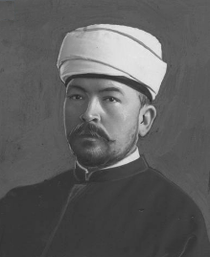Mufti
| Part of a series on Islam |
| Usul al-fiqh |
|---|
| Fiqh |
| Ahkam |
| Theological titles |
|
A mufti (/ˈmʌfti/; Arabic: مفتي muftī; Turkish: müftü) is an Islamic scholar who is an interpreter or expounder of Islamic law (Sharia and fiqh).[1] A muftiate or diyanet is a council of muftis.
William Cleveland wrote in his A History of the Modern Middle East that muftis were "experts in Islamic law qualified to give authoritative legal opinions known as fatwas; muftis were members of the ulama establishment and ranked above qadis".
Within Islamic legal schools, a mufti is considered the pinnacle in the hierarchy of scholars because of the advanced training required for the individual aspiring to be a mufti. Originally, muftis were private individuals who gave fatwas informally, regulated their own activities, and determined their own standards of the fatwa institution. A mufti could also be defined as an individual well-grounded in Islamic law.
Qualifications
A mufti will generally go through a course in iftaa, the issuance of fatwa, and the person should fulfill the following conditions set by scholars in order that he may be able to issue verdicts (fatwas):[2]
- Knowing Arabic,
- Mastering the study of principles of jurisprudence,
- Having sufficient knowledge of social realities,[3]
- Mastering the study of comparative religions,
- Mastering the foundations of social sciences,
- Mastering the study of Maqasid ash-Shari`ah (Objectives of Shari`ah),
- Mastering the study of Hadith,
- Mastering legal maxims.
Gallery
-

Mufti, Mirza Huseyn Qayibzade of Tbilisi
-
.f024.jpg)
Travelling Mufti's of the Ottoman Empire
-

Mufti, Jakub Szynkiewicz
-

Mufti, Absattar Derbisali
-

Ottoman Mufti
-

Ottoman Mufti
-

Ottoman Mufti
-
.jpg)
Tomb of Mufti in Indonesia
-

Mufti, Talgat Tadzhuddin
-

Mufti delivering a sermon
-

Mufti, Ebrahim Desai
See also
References
- ↑ "mufti". thefreedictionary. Retrieved 20 September 2011.
- ↑ Reaching the status of mufti by Abdurrahman ibn Yusuf Mangera.
- ↑ Ask the scholar, Islam online
External links
| Look up mufti in Wiktionary, the free dictionary. |
- The ethics of Muftī by Imam Ibn Khaldûn(French)
-
 "Muftī". Encyclopædia Britannica (11th ed.). 1911.
"Muftī". Encyclopædia Britannica (11th ed.). 1911. -
 "Mufti". New International Encyclopedia. 1905.
"Mufti". New International Encyclopedia. 1905.